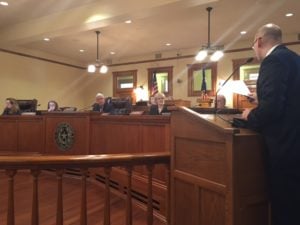But discuss only cost of Williamson County Domestic Relations Office, and claim need for judges to buy in
Part 3 in a Series
Posted Tuesday April 26, 2016 4:03pm

After months of hearing from parents who claim they are being ripped off by racketeering in the family courts of Williamson County, Precinct 1 Commissioner Lisa Birkman briefed the Commissioners Court about research she had done to explore the possibility of establishing a Domestic Relations Office (DRO). That is a goal advocated by the Texas Association for Children and Families (TACF).
Birkman described the duties of the professionals who are appointed by courts to assist in making decisions about child custody. The person appointed will interview the children, parents, and others and report to the judge, she said. In Williamson and most other Texas counties the person appointed would be an attorney or other licensed professional in private practice.
She noted that the Family Code allows the Commissioners Court to establish a DRO, such as the one operated by Travis County. Among other services provided by the Travis County DRO, it has employees qualified to be appointed as guardian ad litem to advise the court on the best interests of children.
“There’s only a few counties that do it that way and it’s expensive,” Birkman said. (Actually there are eight such counties in Texas, per the Texas Association of Domestic Relations Offices.)
Birkman cited cost figures for three DROs:
• Harris County (Houston) has 42 employees and a $3.3 million annual budget.
• Tarrant County (Fort Worth) has 83 employees and a $7.2 million budget.
• Travis County (Austin) has 51 employees and a $3.6 million budget.
“The way we do it in Williamson County, and most counties in Texas, is the parents bear the cost,” Birkman said.
Judges not yet responsive
Birkman said that she had contacted Judge Betsy Lambeth of the 425th District Court and Judge Suzanne Brooks of County Court at Law 1, “to ask if they were interested in this (establishing a DRO in Williamson County) and I have yet to receive a response. It’s been over a month and a half.”
A key point made by Birkman is that whoever is appointed to speak on behalf of the children should be neutral.
“Because obviously if they’re working for one parent or the other parent, they’re not going to be unbiased.”
One of the chief complaints from parents affiliated with TACF is that this neutrality—which is essential to achieving the best outcomes for families and children—falls prey to the profit motive. They allege that some parents have been offered the opportunity to purchase services from certain guardians ad litem, amicus attorneys, or others, who for money will slant their recommendations to the court and offer testimony that’s to the paying parent’s advantage.
Birkman emphasized that setting up a DRO in Williamson County would be pointless unless the judges who hear family law cases buy into it, and agree to use its services.

Precinct 2 Commissioner Cynthia Long said that obtaining the consent of judges is appropriate, given they are “independent elected officials.”
“This is their purview. We would set funding, but it is their purview and their decision, and these are issues coming out of their jurisdiction and not ours,” Long said.

Precinct 3 Commissioner Valerie Covey said she appreciated the information Birkman provided, “But I would need to have a more defined problem that we’re trying to solve, by the number of cases that we’re talking about, and the judges involved in that discussion to see what is actually happening.”
Birkman said, “I’m not denying there may be a need (for a DRO) … but we need to find out from the judges how much of a need it is. I don’t know.”
What is known, based on the latest statistics from the Texas Department of State Health Services, obtained by The Austin Bulldog, is that in 2013 there were 938 divorces in Williamson County and those divorces affected the lives of 985 children under the age of 18.
Reaction to commissioners discussion

Tom Mowdy, a retired U.S. Army major, is not a member of TACF. But he has been working for more than a year to assist the organization by publishing articles on his website that are highly critical of how parents and children have been treated. He was dismayed by the commissioners discussion.
Mowdy said, “Most notable for me was, until the comment by Valerie Covey, the absence of concern for the citizens being victimized by the corrupt court system. Their willingness to address, define, and understand the problem was preceded by a prohibitive foot-dragging philosophy of cost.
“The Commissioners Court ignored the effect and cost it has on citizens while enriching racketeers. The commissioners were defending the current system, which is a government-sanctioned transfer of wealth to the racketeers with no regard for the victims.
“There was no discussion of justice or fairness in our legal system and courts. It is what they did not say that stood out most.”

“The current system is a haven and a cash cow for corrupt individuals willing to commit honest-services fraud and extort families,” said Marina Ginn. She is one of the five parents who in letters submitted to the commissioners named four women who are allegedly part of a racketeering scheme.
“It is incorrect that the judges would have to approve the formation of a DRO. The statute allows commissioners to form it,” she said, referring to Family Code Section 203.002, which states, “A commissioners court may establish a domestic relations office.”
Ginn said, “It will not be judges who are forced to pay damages for the abundance of Federal civil rights litigation that will continue to be brought against the County if this system continues, for failing to supervise despite knowledge of this misconduct. It is not responsible to offer to place the decision in the judges’ hands.
“It is the commissioners job to protect the County from the cost of the litigation that will ensue for these abuses under color of law. The DRO will create jobs and allow for proper hiring and supervision of the employees, and I would be happy to prepare a more detailed cost/benefit analysis upon request.”
Individual parents and a TACF representative have been complaining, both publicly and privately, to the Williamson County Commissioners Court since December 1. They claim that a “racketeering enterprise” has been operating for years in family courts, right under the noses of judges who are dependent upon the recommendations made by court appointees.
They claim that certain professionals appointed by judges are neglecting their duty to look out for the best interests of children—whose welfare is at stake in child custody disputes—and instead are fleecing parents for maximum profit.
The complainants believe that a DRO, staffed with Williamson County employees qualified to serve as court-appointed guardians ad litem, would squash the profit motive. It would ensure that advice provided to courts about what is in the children’s best interest is not affected by ulterior motives.
With guardians ad litem provided by a DRO, parents could be charged a reasonable fee on a sliding-scale based on income, similar to the Travis County DRO. That would prevent parents from being forced into the waiting arms of private practitioners whose fees are substantially higher, and whose payment is guaranteed by judges who act as debt collectors by issuing court orders enforceable by threat of contempt of court.
Parents allege wrongdoing, accused claim innocence

TACF Executive Director Joseph Gale delivered a three-minute speech to the Commissioners Court during the Citizens Comment portion of the agenda Tuesday, April 19. (See link to text of speech below).
Gale noted that TACF had reached out to the Commissioners Court numerous times yet both County Judge Dan Gattis and Commissioner Birkman had stated they could not be of help. These elected officials said complaints could be filed with the appropriate state licensing agencies, but did not understand that many parents have been barred from filing complaints by court orders.
“These families care for their neighbors and have vowed to do their part to make sure the extortion racket, that bankrupted them and harmed their kids, doesn’t happen to a single other child in Williamson County,” Gale told the commissioners.
Gale presented letters from the TACF and from five parents. He said others who have been damaged could not speak out because of “their fear of being retaliated against by the individuals who are holding visitation with their children at ransom.”
Those letters accused four people: attorney Sara Naylor, licensed professional counselors Kelley Baker and Rachel Saenger, and Rhonda Hohmann, who owns Access, a company that provides services related to child custody cases.
Baker, Saenger, and Hohmann via e-mail told The Austin Bulldog that these allegations are untrue. Naylor did not respond to requests for comment.
Links:
Joseph Gale Speech to Williamson County Commissioners Court April 19, 2016 (2 pages) Agenda Item 4
Transcript of Williamson County Commissioners Court discussion, April 19, 2016, (Item 46Q), regarding a Domestic Relations Office (5 pages)
Related Bulldog coverage:
Parents Demand Halt to Extortion: Texas Association for Children and Families and parents demand reforms under threat of lawsuit, April 18, 2016
A Tale of Two Counties: Child custody cases get help in Travis County but in Williamson and most other counties you’re on your own, March 15, 2016


 The public information request that gave rise to a lawsuit in which Travis County Attorney David Escamilla sued Texas Attorney General Ken Paxton has been withdrawn. And with it the litigation over whether the County Attorney must provide the document at issue, as ordered in the AG’s open records ruling.
The public information request that gave rise to a lawsuit in which Travis County Attorney David Escamilla sued Texas Attorney General Ken Paxton has been withdrawn. And with it the litigation over whether the County Attorney must provide the document at issue, as ordered in the AG’s open records ruling. Escamilla declined to comment until a copy of the Settlement Agreement is filed. The Austin Bulldog filed a public information request for a copy of the Agreement and it was not immediately received. (It will be linked at the bottom of this story when obtained.)“We settled,” Austin attorney Bill Aleshire of Aleshire Law PC, told The Austin Bulldog in a telephone interview late yesterday.
Escamilla declined to comment until a copy of the Settlement Agreement is filed. The Austin Bulldog filed a public information request for a copy of the Agreement and it was not immediately received. (It will be linked at the bottom of this story when obtained.)“We settled,” Austin attorney Bill Aleshire of Aleshire Law PC, told The Austin Bulldog in a telephone interview late yesterday. The ability to enter a copy of the DPA into court proceeding is important because the requestor, Tara Coronado, is in a custody dispute with her abuser and former husband over whether one of her four children will be sent to an out-of-state boarding school.
The ability to enter a copy of the DPA into court proceeding is important because the requestor, Tara Coronado, is in a custody dispute with her abuser and former husband over whether one of her four children will be sent to an out-of-state boarding school. “It’s prudent to give you a clear ruling on what’s going to trial,”
“It’s prudent to give you a clear ruling on what’s going to trial,”  At Thursday’s hearing, Assistant County Attorney Tim Labadie argued that the county had not cited other sections of the Act because previous determinations by the AG had allowed the very same DPA to be withheld.
At Thursday’s hearing, Assistant County Attorney Tim Labadie argued that the county had not cited other sections of the Act because previous determinations by the AG had allowed the very same DPA to be withheld.




